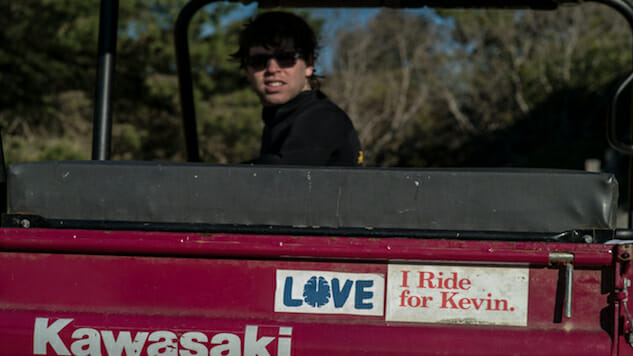Snowboarder Kevin Pearce on Olympic Brain Injuries and the Benefits of Yoga
Photo below courtesy of lululemon
Kevin Pearce was a heavily medaled snowboarder before he began training for the Olympic Trials in 2009, with the hopes of competing in Vancouver in 2010. He had won the European Open Halfpipe, Billabong Air & Style Quarterpipe and Toyota Big Air, to name a few, and those are just some of his first place titles. In short, Pearce was one of the few athletes who could—and did—beat America’s darling Shaun White.

Photo by Jonathan Moore/Getty
That is, until he sustained a traumatic brain injury when he hit his head on the halfpipe in Park City, Utah during his Olympic Trials training, forcing him to cut his career short just shy of the games—what would have been his first.
And while 52,000 of the 1.7 million Americans who sustain brain injuries annually die, Pearce channeled his athletic passion into his recovery, and was back home in five months, after three months of rehab. Oh, and he was back on a board only 712 days after his injury.
Pearce’s remarkable resilience during rehab was brought to life in the award winning HBO documentary The Crash Reel that appeared at Sundance in 2013. With the success of the film and his newfound career in public speaking, he was inspired to found LoveYourBrain, a nonprofit that supports, educates and improves the lives of those affected by traumatic brain injuries, while also focusing on yoga as a way to cope with injury. His work has garnered the support and attention of major athletic outlets and brands, including lululemon, which is touring the country with LoveYourBrain throughout #MindfulMarch to raise awareness of the impacts of traumatic brain injury through yoga, meditation and conversation.
We spoke to Pearce about how yoga has changed his life, what most people don’t know about brain injuries and, of course, snowboarding.
![]()
Paste Health: What’s one thing people don’t know about brain injuries and brain health?
Kevin Pearce: Unlike other injuries, brain injuries have lifelong effects. Brain injuries effect your life in a much bigger way than I would have ever known, until it happened to me. Living with a brain injury for seven years, and still living with the daily ramifications, has been a process that I continue to work on, each and every day.
PH: Would you say you’re fully recovered at this point? If not, what do you want to achieve?
KP: No. I suffer from binocular double-vision due to my fall. I am working to heal and fix this issue by changing my glasses every two hours, every day. The lenses in each pair of glasses are different and through this process, I am ultimately changing the injured brain waves from my accident to align and work better together. I am “seeing” the difference—pun intended! I feel that, one day, I will be able to see perfectly.
PH: How do you approach snowboarding differently now?
KP: Snowboarding for me, now, is a way to escape to total fun and enjoyment. I no longer get on my board needing to win or be the best. I now strap in to feel the enjoyment and freedom that I only find on a snowboard.

Photo by Harry How/Getty
-

-

-

-

-

-

-

-

-

-

-

-

-

-

-

-

-

-

-

-

-

-

-

-

-

-

-

-

-

-

-

-

-

-

-

-

-

-

-

-











































